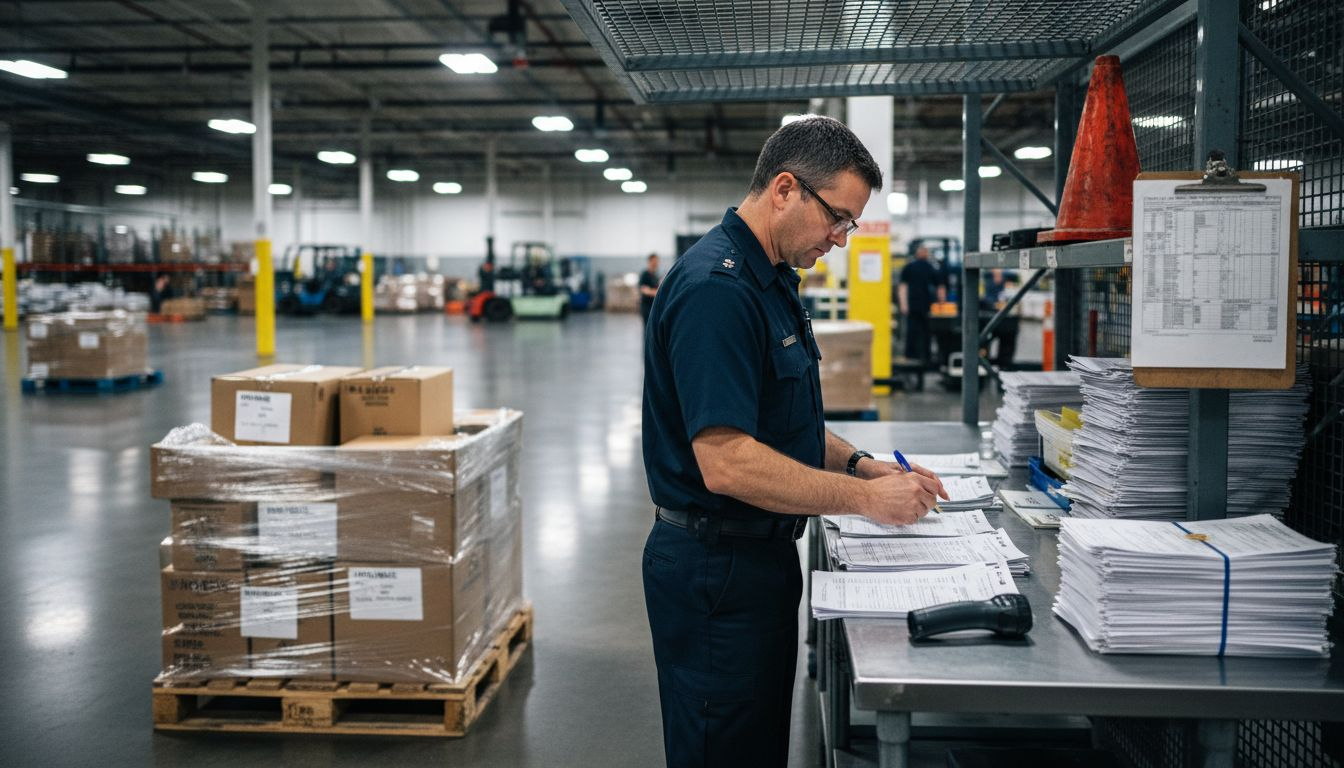Artificial intelligence is shaking up logistics and supply chains everywhere and it is not just hype or headlines. Companies integrating AI have seen operational costs drop by as much as 25 percent and forecasting errors fall by 50 percent. Now here is the wild part. The smartest AI tools are not just watching shipments move from place to place. They are predicting problems before they even happen and helping global brands stay one step ahead.
Table of Contents
- What Is Artificial Intelligence In Logistics?
- Why Artificial Intelligence Matters In Supply Chain Management
- How Artificial Intelligence Transforms Logistics Operations
- Key Concepts And Technologies Behind AI In Logistics
- Real-World Impact Of Artificial Intelligence In Logistics
Quick Summary
| Takeaway | Explanation |
|---|---|
| AI reduces logistics costs significantly | Implementing AI technologies can lower operational expenses by up to 25%, improving overall service quality and efficiency. |
| AI enhances demand forecasting accuracy | Utilizing AI-driven strategies can reduce forecasting errors by as much as 50%, leading to better inventory management. |
| AI automates complex logistics processes | Advanced AI technologies can automate tasks like document processing and route planning, increasing operational speed and accuracy. |
| AI improves supply chain resilience | Organizations leveraging AI can quickly identify disruptions and adapt their strategies, maintaining continuity during unexpected challenges. |
| AI drives operational efficiency | AI technologies can improve operational efficiency by up to 40% through sophisticated data analysis and predictive modeling. |
What is Artificial Intelligence in Logistics?
Artificial intelligence in logistics represents a transformative technological approach that integrates advanced machine learning algorithms and data analytics to optimize complex supply chain and transportation processes. At its core, this technology enables computer systems to simulate human intelligence, process massive datasets, and make autonomous decisions that enhance operational efficiency.
Understanding AI’s Role in Modern Logistics
Artificial intelligence fundamentally reshapes how businesses manage transportation, inventory management, route planning, and predictive maintenance. By analyzing historical data and real-time information, AI systems can generate insights that human operators might overlook. For instance, McKinsey & Company reports that AI-driven logistics solutions can reduce operational costs by up to 20% and improve service levels by 15%.
Key capabilities of AI in logistics include:
- Predictive demand forecasting
- Automated route optimization
- Real-time shipment tracking
- Intelligent inventory management
- Anomaly detection in supply chains
Technical Foundations of Logistics AI
The technical implementation of artificial intelligence in logistics relies on complex algorithms and machine learning models that process multiple data streams simultaneously. These systems utilize neural networks, deep learning, and predictive analytics to transform raw transportation and supply chain data into actionable intelligence. Gartner Research indicates that by 2025, over 50% of supply chain organizations will invest in AI technologies to enhance their operational capabilities.
By continuously learning from new data inputs, AI systems can adapt and improve their decision-making processes, creating increasingly sophisticated logistics management strategies that respond dynamically to changing market conditions and operational challenges.
The following table summarizes the main AI-driven technologies and their primary applications within the logistics sector for easier reference and understanding.
| AI Technology | Primary Application in Logistics | Core Benefit |
|---|---|---|
| Predictive Demand Forecasting | Inventory and Supply Chain Management | Improves forecasting accuracy, reduces costs |
| Automated Route Optimization | Transportation and Delivery Planning | Optimizes delivery times, lowers fuel costs |
| Real-Time Shipment Tracking | Monitoring Shipments | Increases transparency and reduces delays |
| Anomaly Detection | Supply Chain Risk Management | Identifies disruptions, enhances resilience |
| Intelligent Inventory Management | Warehousing and Order Fulfillment | Minimizes overstock and stockouts |
| Autonomous Document Processing | Workflow Automation | Streamlines manual paperwork, speeds tasks |
| Predictive Maintenance Scheduling | Fleet and Equipment Management | Lowers downtime, avoids costly breakdowns |
Why Artificial Intelligence Matters in Supply Chain Management
Artificial intelligence has become a critical technological catalyst in transforming supply chain management from a traditionally reactive operational function to a proactive, strategic business intelligence system. By leveraging advanced computational capabilities, AI enables organizations to anticipate challenges, optimize resources, and create more resilient and efficient supply chain ecosystems.
Strategic Performance Optimization
In today’s complex global marketplace, supply chain managers face unprecedented challenges including unpredictable demand fluctuations, geopolitical disruptions, and rapidly changing consumer expectations. Deloitte Research reveals that companies implementing AI-driven supply chain strategies can reduce forecasting errors by up to 50% and decrease inventory costs by 20-50%.
Key strategic advantages of AI in supply chain management include:
- Enhanced demand prediction accuracy
- Real-time risk assessment and mitigation
- Dynamic pricing optimization
- Automated decision-making processes
- Intelligent resource allocation
Operational Resilience and Adaptability
Artificial intelligence introduces unprecedented levels of operational adaptability by enabling supply chains to respond instantaneously to emerging challenges. Machine learning algorithms continuously analyze multiple data streams, identifying potential disruptions before they significantly impact operations. IBM Supply Chain Insights suggests that AI-powered systems can reduce supply chain disruption times by up to 60%, helping businesses maintain competitive advantage during volatile market conditions.
By transforming massive complex datasets into actionable insights, AI empowers supply chain professionals to make more informed, precise, and forward-looking strategic decisions that drive organizational efficiency and competitive performance.
Below is a table presenting key research statistics that quantify AI’s impact on logistics and supply chain management, helping illustrate the technology’s tangible business value.
| Source | Improvement Area | Quantified Benefit |
|---|---|---|
| McKinsey & Company | Operational Costs | Up to 20-25% reduction |
| Deloitte | Forecasting Errors | Up to 50% reduction |
| Deloitte | Inventory Costs | 20-50% decrease |
| Accenture | Cost from AI Automation | Up to 30% reduction |
| IBM | Disruption Resolution Time | Up to 60% reduction |
| Gartner | Operational Efficiency | Up to 40% improvement |
| Gartner | Investment in AI by 2025 | Over 50% of supply chain organizations |
How Artificial Intelligence Transforms Logistics Operations
Artificial intelligence is revolutionizing logistics operations by introducing unprecedented levels of precision, efficiency, and predictive capabilities across multiple operational domains. This technological integration enables companies to move beyond traditional reactive management strategies toward intelligent, data-driven decision-making processes that optimize every aspect of transportation and supply chain management.
Intelligent Process Automation
AI technologies are fundamentally redesigning logistics workflows by automating complex tasks that were previously performed manually. Accenture Research indicates that AI-powered automation can reduce operational costs by up to 30% while simultaneously improving accuracy and speed. Learn more about digital freight transformation and its technological implications.
Key areas of AI-driven process automation include:
- Automatic document processing
- Autonomous route planning
- Real-time inventory tracking
- Predictive maintenance scheduling
- Intelligent cargo routing
Advanced Predictive Analytics
Machine learning algorithms enable logistics operations to predict potential disruptions, optimize resource allocation, and make proactive strategic decisions. By analyzing historical data and current market conditions, AI systems can generate highly accurate forecasts about shipping times, potential bottlenecks, and optimal transportation strategies. Gartner Research suggests that organizations utilizing advanced predictive analytics can reduce supply chain risks by up to 45%.
These intelligent systems continuously learn and adapt, creating increasingly sophisticated models that transform raw data into strategic insights, ultimately enabling logistics managers to anticipate challenges and develop more resilient operational strategies.
Key Concepts and Technologies Behind AI in Logistics
Artificial intelligence in logistics represents a sophisticated technological ecosystem that integrates multiple advanced computational approaches to transform traditional supply chain management. By combining complex algorithms, data analytics, and machine learning techniques, AI creates intelligent systems capable of processing massive datasets and generating actionable insights with unprecedented accuracy.
Machine Learning and Neural Network Technologies
IBM Research reveals that machine learning algorithms form the foundational architecture of AI logistics technologies, enabling systems to learn from historical data and continuously improve decision-making processes. Learn more about understanding logistics providers and their technological infrastructure.
Key machine learning approaches in logistics include:
- Supervised learning for predictive analytics
- Unsupervised learning for pattern recognition
- Reinforcement learning for dynamic route optimization
- Deep neural networks for complex decision modeling
- Clustering algorithms for demand forecasting
Data Processing and Computational Frameworks
Advanced computational frameworks enable AI systems to transform raw logistics data into strategic intelligence. These technologies leverage complex algorithms that can simultaneously analyze multiple data streams, identifying subtle patterns and potential operational improvements that human analysts might miss. Gartner Research indicates that organizations utilizing sophisticated AI computational frameworks can improve operational efficiency by up to 40%.
The convergence of big data technologies, cloud computing, and advanced machine learning creates a robust technological infrastructure that continuously adapts and optimizes logistics operations, transforming how businesses manage complex supply chain challenges.
Real-World Impact of Artificial Intelligence in Logistics
Artificial intelligence has transitioned from a theoretical concept to a transformative operational tool that is fundamentally reshaping logistics and supply chain management across global industries. By enabling unprecedented levels of data analysis, prediction, and optimization, AI technologies are delivering tangible, measurable improvements in efficiency, cost reduction, and strategic decision-making.
Operational Efficiency and Cost Reduction
PwC Research demonstrates that AI-driven logistics solutions can reduce operational expenses by up to 25% while simultaneously improving service quality.
 Learn more about sustainability in logistics and how technological innovations contribute to more efficient systems.
Learn more about sustainability in logistics and how technological innovations contribute to more efficient systems.
Specific areas of real-world AI implementation include:
- Autonomous warehouse management
- Predictive fleet maintenance
- Dynamic pricing strategies
- Intelligent cargo routing
- Automated customs documentation processing
Enhancing Supply Chain Resilience
McKinsey & Company reveals that organizations leveraging AI technologies can create more adaptable and responsive supply chain networks. Machine learning algorithms enable businesses to quickly identify potential disruptions, develop alternative strategies, and maintain operational continuity during unexpected market challenges.
By transforming raw data into actionable strategic insights, AI empowers logistics professionals to make more informed decisions, anticipate market shifts, and develop proactive management strategies that minimize risks and maximize operational performance.

Ready to Experience the Power of AI-Driven Logistics?
Logistics is changing fast. As you read about the impact of artificial intelligence in transportation, freight, and supply chain management, it is clear that staying ahead means more than just keeping up with technology. You need real solutions that ease pain points like unpredictable shipping, inefficient routes, and complex global compliance. At Worldwide Express, Inc., our team perfectly blends industry expertise with the latest AI advancements to help your business adapt and thrive in a dynamic market. Discover how proven technologies like predictive analytics and automated tracking can streamline your workflow so you can focus on growth.

Do not let outdated processes hold your business back. Connect with experts who turn advanced concepts into everyday success. Visit our Uncategorized – Worldwide Express, Inc. resources or go directly to Worldwide Express, Inc. to see how we solve modern logistics challenges today. Take advantage of our tailored global freight solutions and move your business forward with confidence.
Frequently Asked Questions
What is artificial intelligence in logistics?
Artificial intelligence in logistics involves the integration of advanced machine learning algorithms and data analytics to optimize supply chain and transportation processes, enhancing operational efficiency and enabling autonomous decision-making.
How does AI improve demand forecasting in logistics?
AI enhances demand forecasting by analyzing historical data and real-time information, leading to significantly improved accuracy and reduced forecasting errors, which can decrease inventory costs by 20-50%.
What are the key benefits of AI in supply chain management?
The key benefits of AI in supply chain management include enhanced demand prediction accuracy, real-time risk assessment, dynamic pricing optimization, automated decision-making, and improved resource allocation.
How does machine learning contribute to logistics efficiency?
Machine learning contributes to logistics efficiency by continuously analyzing data to identify patterns and potential disruptions, allowing for proactive resource allocation and optimization of transportation strategies.
Recommended
- Understanding Logistic Providers: Key Concepts Explained – Worldwide Express, Inc.
- Understanding Sustainability in Logistics: Key Insights – Worldwide Express, Inc.
- Understanding Digital Freight Forwarding and Its Impact – Worldwide Express, Inc.
- Understanding Freight Rate Negotiation: Key Concepts Explained – Worldwide Express, Inc.
- The Impact of AI on SEO in 2025: Key Changes for Businesses






